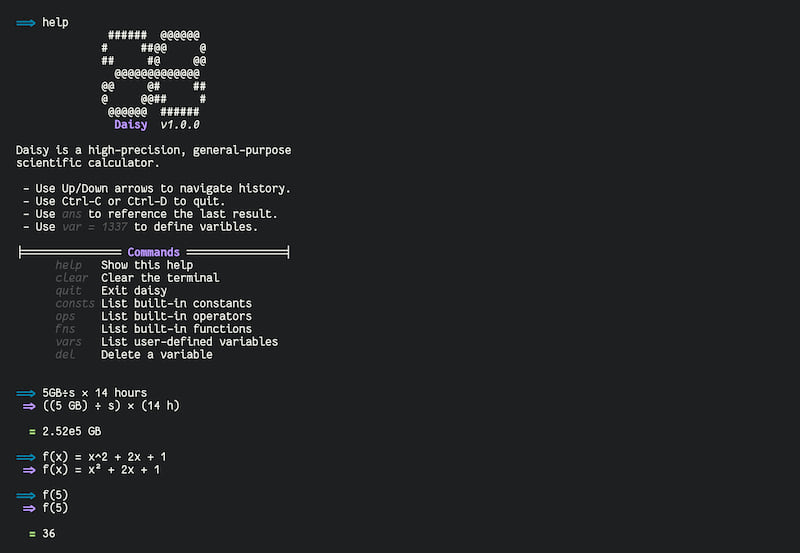18 releases (9 stable)
| 1.1.7 | Oct 15, 2023 |
|---|---|
| 1.1.5 | Sep 28, 2023 |
| 1.0.1 | Aug 17, 2023 |
| 0.2.16 | Aug 2, 2023 |
| 0.2.9 | Jul 31, 2023 |
#497 in Math
720KB
5.5K
SLoC

A high-precision scientific calculator with support for units, derivatives, and more.
Many features are missing, this is still under development.
Web demo: here (won't work on mobile)
📦 Installation
- From source:
cargo build --release, binary will be at./target/release/daisy - Cargo:
cargo install daisycalc - Arch:
yay -S daisy - Debian: coming soon
- Nix: Use
default.nix. Daisy isn't in nixpkgs yet, you'll need to add something like the following toconfiguration.nix:
let
daisy = builtins.fetchGit {
url = "https://github.com/rm-dr/daisy.git";
ref = "master";
} + /default.nix;
in
{
environment.systemPackages = with pkgs; [
(callPackage daisy { })
];
}
📹 Screenshot
🛠️ Features
- Open-source
- Extremely high precision
- Uses a rational datatype when possible, and a high-precision float when not.
- Pretty printing in prompt (with special substitutions)
- Supports many physical units, with metric and binary prefixes
- Supports exponential notation
- Clear syntax, parsed input is always re-printed as a sanity check.
- Useful, detailed error messages
📑 Usage
All documentation is built into the prompt. Use the help command to view it.
Evaluate expressions:
- Basic math:
103 / 2 * 43 - Functions:
sqrt(1.4^3 + 4) * sin(pi / 4) - Scientific notation:
1.2e12 * 1e-5
Physical units
- Unit operations:
2 day + 1 hour - Unit conversion:
2 day + 1 hour to minutes - Compound units:
10 m/s to mph - Conversion errors:
1 liter to volt
Varables
- Previous answer:
ans + 2 - Variable assignment:
a = 143
🌹 Additional Notes
Unit Conversion
The conversion operator to converts its left argument to the unit of its right argument, ignoring its value. For example, 5m to mi and 5m to 10mi are identical.
Celsius and Fahrenheit
Celsius and Fahrenheit are not supported as first-class units because they require an offset when converting from other temperature units. This leads to ambiguity when adding units, since one temperature must be seen as a difference rather than an absolute temperature.
Daisy instead provides four functions (fromCelsius, toCelsius, fromFahrenheit, toFahrenheit) which convert between scalars and Kelvin.
- "from" functions take a scalar and return a value in Kelvin:
fromCelsius(0) = 273.15K - "to" functions take a value in Kelvin and return a scalar:
toCelsius(273.15 K) = 0
Multiplication Order
Implicit multiplication has a higher priority than division. pi/2 radians will parse as pi/(2 radians). Type (pi/2) radians or pi/2 * radians to get 90 degrees.
